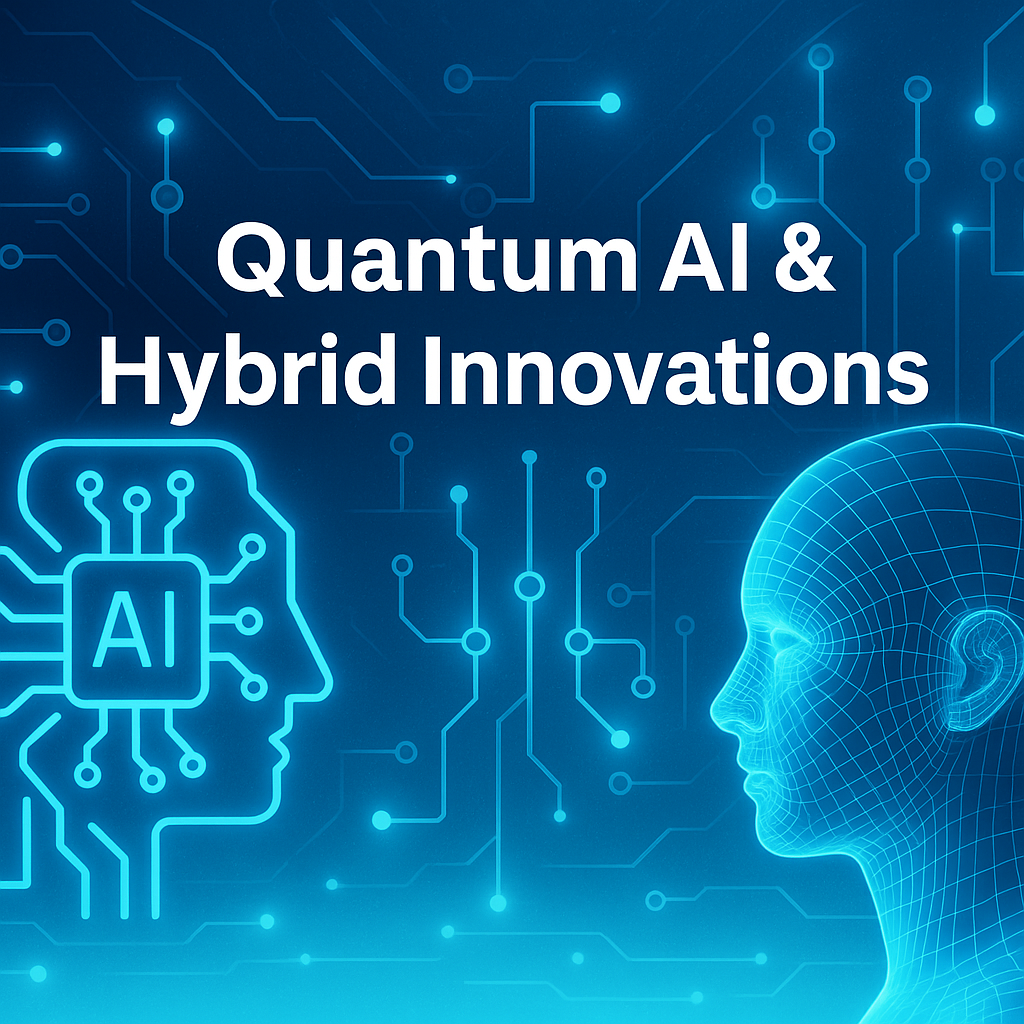The Next Leap in Computational Intelligence
For decades, computing has relied on classical architectures binary systems that process information in the form of ones and zeros.
That approach has taken us far, powering everything from smartphones to self-driving cars.
But as problems grow more complex and data becomes vast, traditional methods begin to show their limits.
This is where Quantum AI enters the stage, merging the immense potential of quantum computing with the adaptive intelligence of AI.
The combination isn’t just another upgrade in computational power; it’s an entirely new way of solving problems that were once considered impossible.
Let’s explore how this hybrid innovation is reshaping industries, research, and the very foundations of intelligence in machines.
Understanding the Basics of Quantum AI
To understand Quantum AI, we first need to unpack the two halves that define it quantum computing and artificial intelligence.
Quantum computing relies on quantum bits, or qubits, which can exist in multiple states at once due to a property known as superposition.
Unlike classical bits that represent either a 0 or 1, qubits can represent both simultaneously.
This allows quantum computers to explore a vast range of possibilities in parallel, performing certain computations exponentially faster than classical systems.
Artificial intelligence, on the other hand, thrives on pattern recognition and data learning.
It processes data, identifies relationships, and makes predictions but it’s limited by the processing power of classical computers.
As AI models grow in complexity, so do their computational needs.
When these two technologies converge, the outcome is Quantum AI an intelligent system that learns and operates at speeds traditional machines can’t match.
It’s like giving AI access to an entirely new dimension of thinking power.
Why Quantum AI Matters
The potential of Quantum AI lies in its ability to tackle problems that are too complex for even the most powerful supercomputers.
For instance:
- Drug discovery: Quantum algorithms can simulate molecular interactions at a quantum level, identifying potential drug candidates faster than any classical simulation.
- Financial modeling: Quantum-powered AI can evaluate millions of financial scenarios simultaneously, offering more precise risk predictions.
- Climate modeling: Understanding the planet’s atmosphere and ecosystems requires solving equations with countless variables a task that Quantum AI can accelerate dramatically.
By combining the learning capability of AI with the raw power of quantum systems, scientists and engineers can explore data-driven insights at a speed once thought impossible.
The Hybrid Innovation Model
Hybrid innovation isn’t just about blending technologies it’s about combining different strengths to overcome existing limitations.
Quantum computers are still in their early stages; they’re expensive, sensitive, and not widely available.
But researchers have found ways to pair quantum processors with classical systems in what’s known as a hybrid architecture.
In this setup, the classical computer handles tasks like data pre-processing, control logic, and interpretation, while the quantum component deals with computationally heavy operations.
AI models then integrate both outputs, learning from results that classical systems alone could never compute.
This hybrid structure doesn’t replace traditional computing; it amplifies it.
It’s the bridge that allows businesses and researchers to start reaping quantum benefits without needing fully quantum infrastructure.
How Quantum AI Works in Practice
The workflow of Quantum AI typically involves three stages:
- Data Encoding:
Information is converted into quantum-compatible formats. Since qubits behave differently than classical bits, data must be represented as quantum states. - Quantum Processing:
The quantum processor executes algorithms, exploring a vast range of potential outcomes simultaneously. This step dramatically speeds up problem-solving compared to conventional systems. - AI Integration:
The results are fed into AI models that interpret and refine outcomes. Machine learning algorithms then analyze these quantum-processed datasets, improving accuracy, predictions, and overall decision-making.
A simple analogy is imagining a massive maze: classical computing explores one path at a time, AI predicts which paths might work better, but Quantum AI can test thousands of paths simultaneously and teach the AI which are worth following next time.
Quantum Algorithms Fueling AI
Quantum algorithms are at the heart of this transformation. A few examples include:
- Quantum Approximate Optimization Algorithm (QAOA) used for solving combinatorial problems such as scheduling or route optimization.
- Quantum Support Vector Machine (QSVM) enhances classification models used in predictive analytics.
- Variational Quantum Eigensolver (VQE) vital in chemistry and materials science for calculating molecular properties efficiently.
These algorithms act as the foundation for AI systems that learn faster, identify better solutions, and adapt with greater efficiency.
Industry Applications of Quantum AI
The impact of Quantum AI extends across industries, redefining how problems are approached and solutions are designed.
1. Healthcare and Biotech
Quantum AI is accelerating personalized medicine by simulating genetic variations and drug interactions at a molecular level. It can model complex biological structures and identify treatment paths that fit individual patients.
2. Finance and Investment
From high-frequency trading to fraud detection, Quantum AI can process multidimensional data faster than classical AI. It enhances portfolio optimization, risk modeling, and asset valuation with greater accuracy.
3. Energy and Sustainability
Quantum AI assists in optimizing grid performance, simulating chemical reactions for cleaner fuels, and predicting demand more efficiently. This has direct implications for renewable energy management and sustainable resource planning.
4. Cybersecurity
Quantum systems offer both a threat and a solution in cybersecurity. While quantum decryption poses risks to traditional encryption, Quantum AI can also help develop stronger cryptographic systems based on quantum-safe algorithms.
5. Manufacturing and Logistics
Quantum AI aids in supply chain optimization, predictive maintenance, and material design. Factories can simulate production workflows at a molecular level, improving efficiency while reducing waste.
Challenges Holding Back Quantum AI
Despite the promise, Quantum AI is still maturing. Several challenges stand in the way of mainstream adoption:
- Hardware Instability: Quantum computers are sensitive to environmental changes like temperature or vibration, which can cause computational errors.
- Scalability: Building large-scale quantum systems with millions of qubits remains a technical hurdle.
- Cost: Quantum computing hardware is expensive to build and maintain, limiting access to a few major institutions.
- Talent Gap: Expertise in both quantum physics and AI is rare, creating a significant skill shortage.
- Data Transfer: Converting classical data into quantum-readable formats requires specialized techniques, adding to system complexity.
These challenges are not roadblocks, but milestones that the research community is steadily overcoming.
Recent Advancements in Quantum AI
The pace of innovation is accelerating rapidly. Major milestones in recent years include:
- IBM’s Quantum Roadmap IBM announced quantum processors with over 1000 qubits, moving closer to practical applications.
- Google’s Quantum Supremacy Claim Google’s Sycamore processor demonstrated computational power that outperformed classical systems for a specific task.
- Hybrid Cloud Integration Companies like Microsoft and Amazon have introduced platforms that integrate quantum simulators with AI cloud services, allowing developers to experiment with hybrid workflows.
- AI-Driven Quantum Error Correction Researchers are using AI algorithms to reduce noise and improve accuracy in quantum calculations.
These advancements suggest that Quantum AI may soon transition from theoretical experiments to real-world solutions.
The Human Element Behind Quantum AI
While Quantum AI represents the pinnacle of machine intelligence, it’s still shaped by human curiosity and creativity.
Behind every algorithm lies a team of scientists, engineers, and designers redefining what’s possible.
One of the most intriguing aspects is how human intuition and quantum randomness coexist. Quantum systems don’t operate deterministically their outputs are probabilistic.
AI models interpret these probabilities, and humans fine-tune them into meaningful outcomes.
This collaboration of physics, data, and creativity represents the new frontier of computational thinking.
What the Future Holds
The next phase of Quantum AI will likely involve tighter integration between cloud computing, edge systems, and quantum hardware.
As hybrid platforms mature, developers may soon train AI models using quantum resources without specialized hardware on-site.
In the long run, we could see:
- Quantum neural networks capable of unsupervised learning from massive datasets.
- Quantum-enhanced reinforcement learning that trains intelligent agents for real-world tasks.
- Adaptive hybrid models that shift between quantum and classical modes depending on task requirements.
When these capabilities become mainstream, industries will move beyond incremental improvements and enter a phase of exponential discovery.
Conclusion
Quantum AI isn’t a distant dream. It’s a glimpse into a future where intelligence and physics converge to tackle challenges that lie beyond current computational reach.
By combining quantum computing’s extraordinary parallelism with AI’s learning power, we’re unlocking tools that can analyze, predict, and create at unmatched speed and depth.
While technical and ethical hurdles remain, one thing is certain Quantum AI represents the dawn of a new age in intelligent computation.
It’s not just smarter machines we’re building; it’s a smarter way of thinking about the universe itself




